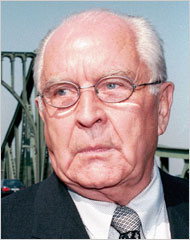Wolfgang Vogel facts for kids
Quick facts for kids
Wolfgang Vogel
|
|
|---|---|
 |
|
| Born | 30 October 1925 Wilhelmsthal, Lower Silesia
|
| Died | 21 August 2008 (aged 82) Schliersee, Bavaria
|
| Nationality | German |
| Occupation | Dr. jur. h.c. Lawyer |
Wolfgang Vogel (October 30, 1925 – August 21, 2008) was a German lawyer who lived during the Cold War. This was a time when the world was divided into two main sides. Vogel became well-known for arranging exchanges of spies and political prisoners. He helped people move between the Eastern Bloc (countries allied with the Soviet Union) and the Western world. For about 30 years, he acted as a special link between these two very different sides. His work was so interesting that it was even compared to spy novels.
Early Life and Education
Wolfgang Vogel was born on October 30, 1925. His hometown was Wilhelmsthal, a small mountain village in what is now Poland. After World War II, he studied law at universities in Jena and Leipzig. He then became a lawyer.
In 1946, he married his first wife, Eva. They had two children together. Later, in 1974, Vogel married his second wife, Helga Fritsch. She worked as a secretary in his office in Berlin. After Germany became one country again, Wolfgang and Helga lived in Schliersee, a town in the Bavarian Alps.
A Bridge Between Worlds
Vogel worked for the Stasi, which was the secret police of East Germany. His job was to make connections with lawyers in West Germany. This work slowly led him to become a key person in arranging spy swaps and prisoner exchanges. These exchanges made him very famous in East Germany.
His first major negotiation involved trading two Americans, Francis Gary Powers and Frederic Pryor. They were exchanged for a Soviet spy named Vilyam Genrikhovich Fisher. Vogel also helped arrange the exchange of Günter Guillaume in 1981. Guillaume was an East German spy, and he was traded for Western agents who had been captured.
Overall, Wolfgang Vogel helped exchange more than 150 spies. He also played a part in the exchange of Anatoly Shcharansky in 1986. Beyond spies, Vogel helped more than 34,000 East German political prisoners move to the West. He also helped 215,000 regular citizens move to the West, starting in 1964.
After German Reunification
After East and West Germany became one country again, Vogel's past work with the Stasi led to some legal challenges. He was accused of certain wrongdoings. In 1996, he was found guilty of some charges, which led to a short time in prison. However, he appealed this decision. In 1998, Germany's highest court found him innocent in some of the cases. Prosecutors then agreed to drop the other accusations against him.
Wolfgang Vogel passed away at his home in Schliersee, Bavaria. He died after having a heart attack.
His Legacy
The German broadcaster Deutsche Welle reported on Vogel's death. They said that during the busiest time of the Cold War, Vogel was the only contact person between West and East Germany. This was because the two countries officially denied having any direct talks at that time.
Wolfgang Vogel's important role was also shown in the 2015 film Bridge of Spies. This movie was directed by Steven Spielberg. In the film, actor Sebastian Koch played the role of Wolfgang Vogel.
 | George Robert Carruthers |
 | Patricia Bath |
 | Jan Ernst Matzeliger |
 | Alexander Miles |

